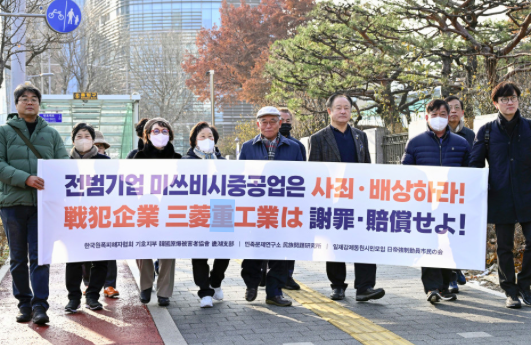S Korean court orders Japanese company to compensate forced labour victim
The ruling by the Supreme Court upholds lower court decisions requiring Japanese companies to compensate workers or their families for forced labour during Japan’s colonial occupation of the Korean Peninsula. This weakens the Japan-South Korea agreement of March 2023 setting up a voluntary compensation fund. A painful shared past still weighs heavily on the rapprochement between the two countries, with major security implications over North Korea.
Seoul (AsiaNews/Agencies) – South Korea's Supreme Court today upheld lower court decisions ordering Japanese steelmaker Nippon Steel Corp and two other Japanese companies to compensate South Koreans employed as forced labourers in World War II and during Japan’s colonial rule of the Korean Peninsula.
The ruling raises new questions about the ongoing rapprochement between Japan and South Korea. In particular, it marks a setback for a plan, announced in March 2023, to create a fund to which Japan and the companies involved would contribute to compensating victims.
It was the voluntary nature of the contribution that the Supreme Court was called upon to rule.
According to South Korea, about 780,000 Koreans were conscripted into forced labour by Japan during its 35 years of occupation (1910-1945) of Korea, while more than 200,000 young women were forced into sexual slavery by the Japanese military.
Japan’s answer has always been that all issues arising from its colonisation of its neighbour were settled "completely and finally”, including reparations, in 1965, with the signing of the Agreement on the Settlement of Problems Concerning Property and Claims and on Economic Co-operation.
Japan provided US$ 800 million in grants and soft loans to South Korea, which were presented to their respective populations as economic assistance; none was given to victims but were diverted by the authoritarian regime of Park Chung-hee (1961-79) to finance the country's industrialisation and economic development.
In 2018, the South Korean Supreme Court ruled that the 1965 Agreement did not extinguish the right of individuals to bring claims for compensation against Japanese companies. On this basis, it established compensation of approximately US$ 88,700 per claimant.
At the time, the Japanese government led by then-Prime Minister Shinzo Abe asked Japanese companies not to comply with the court decision.
In July 2019, Japan removed South Korea from its list of privileged trading partners by introducing stricter inspections on the export of three chemical compounds, up to 90 per cent of which are produced in Japan, and are crucial for some South Korean semiconductor firms.
With the election of a conservative as South Korea’s president in 2022, the two countries have tried to mend their economic and political fences with the mediation of the United States, especially to deal with threats from North Korea.
In March 2023, an agreement was announced to resolve the issue. South Korea would set up a foundation to compensate victims granted reparations by the Supreme Court and its Japanese partners would make a one-time contribution.
As might be expected, such a solution was criticised in South Korea with the country’s liberal opposition describing it as another example of the government’s "humiliating diplomacy" towards Japan.
And today, South Korea’s Supreme Court upheld the decision of a lower court in favour of the family of a South Korean man who died in 2012. The latter was never compensated even though he was forced to work in poor conditions in a steel mill factory during World War II.
Thus, the court decision undermines the usefulness of the fund set up by the South Korean government in March 2023.
Photo: Plaintiffs in Seoul demanding damages for wartime work march towards South Korea’s Supreme Court.
12/02/2016 15:14
30/10/2018 16:04
06/03/2023 16:03







.png)










